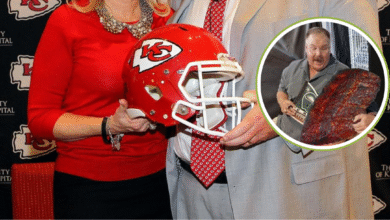Owens’ Explosive Rant at McNabb in 2005 – Super Bowl Fallout Hid Team Betrayal
OPINION: This article may contain commentary which reflects the author's opinion.
The 2005 Super Bowl XXXIX matchup between the Philadelphia Eagles and the New England Patriots was a clash of titans, but for Eagles fans, it remains a painful memory of what could have been. At the center of the storm was Terrell Owens, the electrifying wide receiver whose larger-than-life personality both galvanized and fractured the team. Days after the Eagles’ 24-21 loss in Jacksonville, Owens unleashed an explosive rant at quarterback Donovan McNabb, a public tirade that masked a deeper betrayal within the team—one that remains shrouded in whispers and unresolved to this day.
Owens was a force of nature in 2004, transforming the Eagles’ offense with his speed and swagger. Despite a severe ankle injury in Week 15, he defied medical odds to return for the Super Bowl, delivering nine catches for 122 yards in a heroic performance. McNabb, the franchise quarterback, was equally vital, leading Philly to its first Super Bowl appearance in 24 years. On the surface, the duo was unstoppable, but beneath the camaraderie lay a powder keg of tension.
The trouble began during Super Bowl preparations. Owens, known for his brash confidence, clashed with McNabb over the game plan. The receiver pushed for more deep routes to exploit New England’s secondary, while McNabb, backed by head coach Andy Reid, favored a balanced approach to control the clock. Tensions escalated during the game, as McNabb’s late-game struggles—three interceptions and a rumored bout of fatigue or illness—drew scrutiny. Owens, frustrated by underutilized opportunities, felt McNabb had choked under pressure.
The breaking point came days later in a team meeting. Owens, still fuming, confronted McNabb in front of teammates, accusing him of “folding” and costing the Eagles the championship. “You didn’t have my back out there!” Owens reportedly shouted, according to a source who witnessed the exchange. The rant, partially leaked to the media, became a national story, painting Owens as a divisive figure and McNabb as a victim of his teammate’s ego. But the outburst was a smokescreen for a more sinister truth: a betrayal within the Eagles’ ranks that went beyond the quarterback-receiver feud.
Rumors, sparsely reported at the time, suggested that a faction of the coaching staff had undermined the team’s Super Bowl effort. Offensive coordinator Brad Childress, who had a strained relationship with Owens, allegedly clashed with Reid over the game plan’s conservative nature. Insiders claimed Childress, frustrated by Reid’s refusal to open up the offense, shared insights about Philly’s tendencies with a Patriots staffer during pre-game networking—a move that, while not illegal, bordered on disloyalty. New England’s defense, led by Bill Belichick, seemed uncannily prepared for McNabb’s audibles, intercepting him at critical moments.
Owens, unaware of the coaching betrayal, channeled his anger at McNabb, whose visible exhaustion in the fourth quarter became a convenient scapegoat. The quarterback, stung by the accusation, withdrew from teammates, deepening the locker room divide. Reid, desperate to maintain control, downplayed the incident, but the damage was done. Owens’ suspension later in the 2005 season, after further public criticism of McNabb, marked the end of his Eagles tenure, but the true story of the Super Bowl fallout remained buried.
X posts from Eagles fans in the years since have kept the rumor alive, with some pointing to Childress’ abrupt departure to Minnesota in 2006 as evidence of his role in the betrayal. Local Philly radio hosts, citing anonymous sources, speculated that Reid’s reluctance to address the coaching staff’s dysfunction allowed the rift to fester. McNabb, in rare comments, acknowledged the “tough times” but never confirmed the deeper story. Owens, ever outspoken, hinted in a 2010 interview that “some things went down that people don’t know about,” but offered no specifics.
The 2005 Super Bowl loss scarred the Eagles’ fanbase, a wound reopened each time the team falls short of a championship. Owens’ rant, though vilified at the time, was a symptom of a larger betrayal—one that pitted coaches against players and fractured a team on the verge of greatness. As the Eagles chase another title, the Jacksonville fallout serves as a reminder that even the most talented rosters can crumble when trust is broken.



